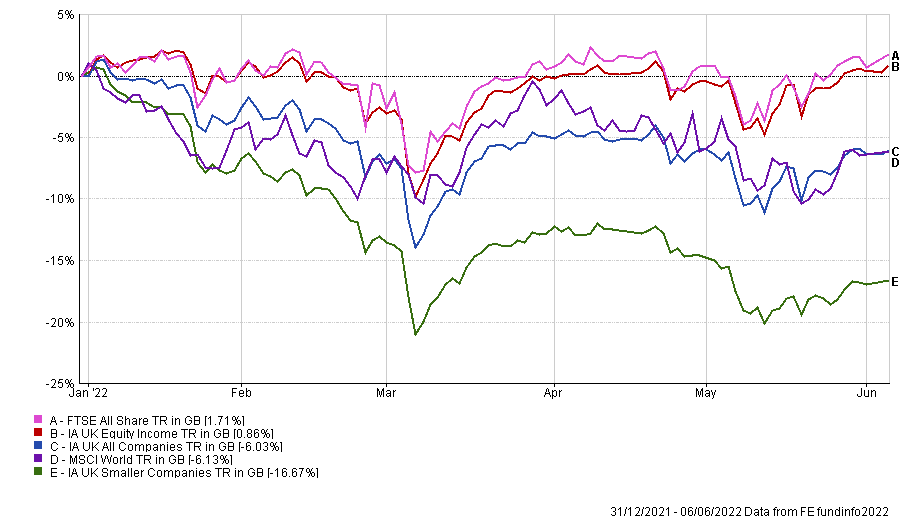After a tough year so far, there was little respite for UK funds in May as investors sold more than £800m, according to the latest data from Calastone’s Fund Flow Index.
Equities in general suffered their worst start to a year on record, with £310m shed in May. This takes the net outflows of equity portfolios to £877m for 2022, a stark contrast to the £9bn added in the first five months of 2021.
The report showed that in total, a net £826m was pulled out of UK equity funds, the 12th consecutive month of net outflows from the three Investment Association sectors (UK All Companies, UK Equity Income and UK Smaller Companies) focused on this asset class.
It means that the three worst months on record for UK equity funds have come in 2022, with May’s £826m outflows beaten only by April’s figure of £836m.
However, there was some joy for beleaguered income portfolios, with investors adding £36m to this sector on average. It marks the first month in two years that the IA UK Equity Income sector has received inflows, according to data from the Investment Association yesterday.
So far this year, the IA UK Equity Income and IA UK All Companies sectors have beaten global equities (as measured by the MSCI World index). However, both have lagged behind the FTSE All Share index, as the below chart shows.
Total return of sectors vs indices in 2022 so far

Source: FE Analytics
Just like in April, the UK was far from alone in experiencing outflows. European equity funds had their worst month of the year, shedding a net £389m as the war in Ukraine continued to rage.
Global funds were the only geographical category that saw significant inflows (£659m), of which £8 in every £10 was devoted to environmental, social and governance (ESG) strategies.
The contrast between non-ESG equity funds and their ESG counterparts was “stark”, the report said, with the former suffering net outflows of £3.7bn this year, while the latter had inflows of £2.8bn.
Edward Glyn, head of global markets at Calastone, said: “It’s relatively unusual for equity funds overall to see outflows. There is instead an in-built bias towards net investment simply because British investors steadily put away a portion of their income each month.”
“Equity funds are facing a double squeeze at present however,” he noted. First is the high volatility brought about by rising interest rates and war, both of which mean there is a heightened fear of losses, which is deterring investors from adding new capital.
The other is the squeeze on household incomes caused by higher prices, which is forcing people to spend more on their bills, or hold back cash just in case.
Household cash balances grew by £13.5bn in April, according to Bank of England figures, the highest figure since lockdowns were in force.
“UK funds are taking particular punishment. In the short term, UK funds are one of the largest categories by assets under management, so they are an obvious first port of call for investors wanting to reduce equity exposure, even though the UK index has proved resilient this year,” said Glyn.
However, he noted that there is also a long-term trend at play, as investors are diversifying their holdings away from a UK stock market that is “highly concentrated at the top end and exposed to a lacklustre UK economy at the bottom”.
Global funds solve both these problems, which may be why they have absorbed £41bn since 2015, while UK funds have shed £1.2bn.
Away from stocks, there were clear signs that the property fund slump may be coming to an end, the report said, with redemptions of £8.1m in May, the lowest since 2018.
While some of this was simply a reduction in selling, there was also a marked increase in buying interest, with the number of purchases up by almost a fifth compared with the average over the past year.
“The turnaround for equity income funds reflects the relative inflation protection that income-generating stocks provide and signs that property funds may be coming back into favour are driven by the same forces,” said Glyn.





